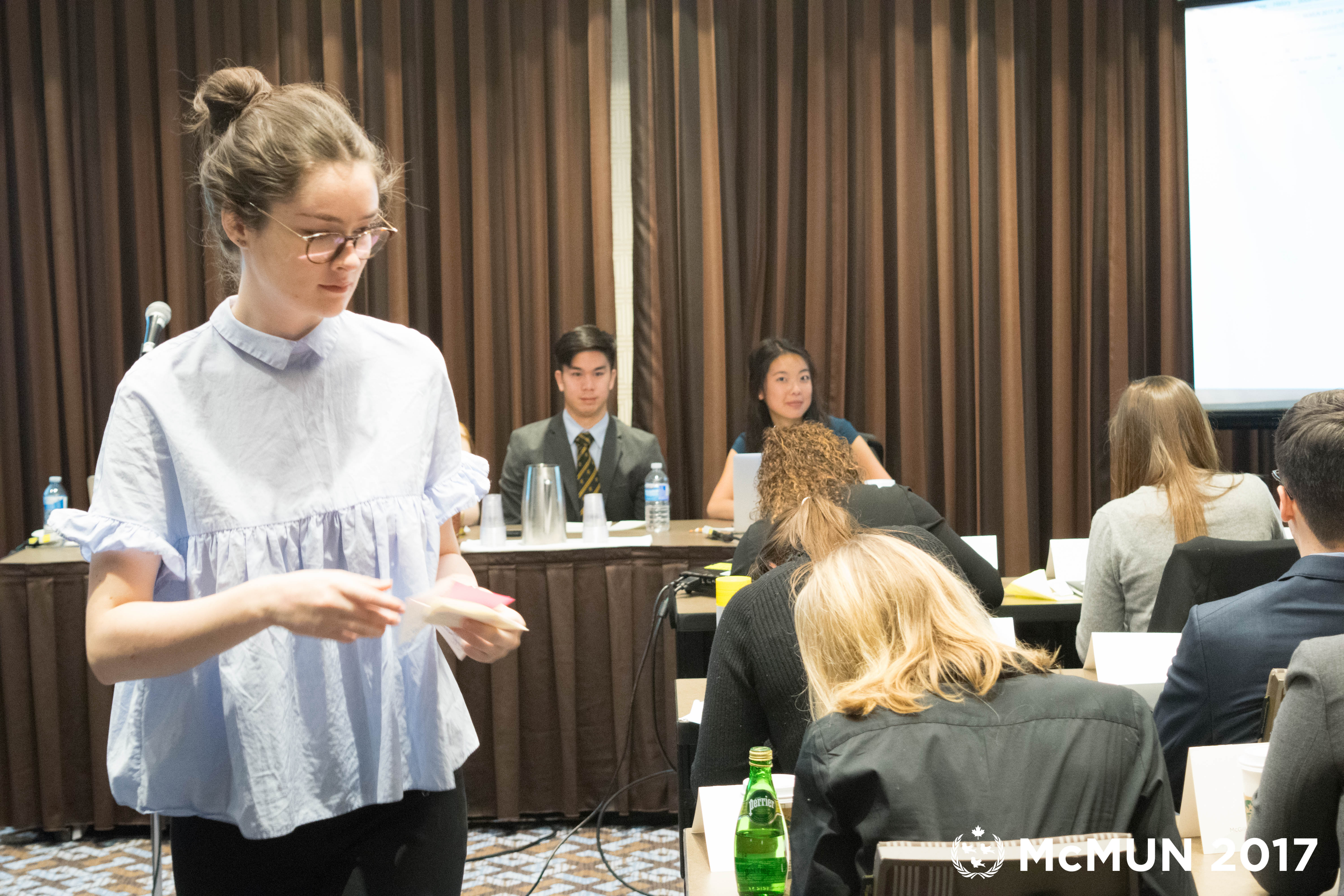McMUN 2017 Women’s Committee: Moving Towards the Economic Empowerment of Women

This year, the theme of the United Nations’ Women’s Committee was about women’s economic empowerment. During their third committee session I had a chance to meet with Chair Dan Ton-That to get his thoughts how the conference has progressed so far. His positive sentiment was evident: “I’ve done McMUN for 5 years now I am honestly so impressed with the delegates I have in the UN committee. They embody and exemplify passion, diplomacy, and most importantly respect. From a chair’s perspective, you can really see this from the small things such as their calm demeanour during procedure or their attentiveness during speeches as well as the more substantial components of committee such as working together in unmoderated caucus or completing 6 excellent draft resolutions.” Indeed, by this afternoon session, delegates had already drafted their working papers and were in the process of making final changes. The afternoon session proceeded with a nine-minute caucus with 45-second speaking time synopsis of the major points of the various working papers. Personally, I was thoroughly impressed by how efficiently delegates got their message through, and then some, within the short time allotted. While each paper has its own particularities, a recurring theme was the need to be “culturally sensitive,” “respect people and culture,” and to “empower the people,” as well as the need to have a multi-tier system and to challenge gender norms.
The Committee then welcomed Speaker Prof. Cassandra Steer, current Junior Wainwright Fellow at McGill’s Faculty of Law, and a Visiting Fellow with the Centre for Human Rights and Legal Pluralism, to speak to delegates about the values and challenges of an increased female presence within the United Nations. A former intern at the International Criminal Court, Steer talked about the U.N. Security Council Resolution 1325, which encouraged nations to increase women’s participation and incorporate gender perspectives across all UN peace and security endeavours. She applauded this effort, mentioning that having more women “allows us to protect against sexual violence, […] [have] better intelligence gatherings, […] and we can build alliances with local communities where […] there are attempts for transitional justice to move communities and societies out of conflict.” She also encourages gender mainstreaming, the practice of assessing practical implications for men and women in the various action policies. She then turned to the difficulty of implementing Resolution 1325 when it comes to diversity. Given that gender issues vary across regions, “we know that it matters when we have men and women at the table, when you have people from diverse ethnic and racial backgrounds at the decision making tables, when you increase participation across the boards, you increase the awareness of the different kind of issues and the way that people are affected, that may not match mainstream ideas around security and peacekeeping.” In closing, she left delegates reflecting on the journey of women’s empowerment and what is still left to be done.
Her talk clearly inspired the delegates, as evidenced by the question and answer portion, as well as the presentation of the draft resolutions. With the remaining time, three of the six draft resolutions were presented: 1.1) Grow Locally, Think Globally: Empowering Women Through Financial Opportunity and Education, 1.2) Girls Just Wanna Have Fun-damental Rights, and 1.3) One Goal. The remaining 3 draft resolutions will be presented in the Saturday session. While there was general support for these resolutions, which all aim to provide new opportunities for disadvantaged women, there was concern on specific clauses, overall feasibility, and cultural sensitivity. Despite these “setbacks,” Dan is very pleased with his delegates. “They worked tirelessly in the morning to the afternoon and never lost their motivation, energy or patience despite my numerous hiccups,” with the last sentence referring to rare mental lapses throughout the session. He also offers these words of advice: “Honestly, at the end of the day, I hope the delegates gain different perspectives, confidence in themselves, and most importantly, new friends. I have the utmost faith that tomorrow will be just as successful and that they will pass multiple resolutions to foster gender equality globally.” Indeed, while these resolutions will only last throughout the conference, the friendships made in the room, as well as the invaluable teamwork and speaking experience, will surely last the delegates a lifetime.
